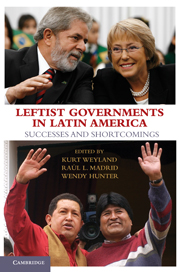Book contents
- Frontmatter
- Contents
- Acknowledgments
- Acronyms and Abbreviations
- Contributors
- 1 The Performance of Leftist Governments in Latin America: Conceptual and Theoretical Issues
- 2 The Repeating Revolution: Chávez's New Politics and Old Economics
- 3 The Challenge of Progressive Change under Evo Morales
- 4 The Chilean Left in Power: Achievements, Failures, and Omissions
- 5 From Cardoso to Lula: The Triumph of Pragmatism in Brazil
- 6 Lula's Administration at a Crossroads: The Difficult Combination of Stability and Development in Brazil
- 7 The Policies and Performance of the Contestatory and Moderate Left
- Bibliography
- Index
5 - From Cardoso to Lula: The Triumph of Pragmatism in Brazil
Published online by Cambridge University Press: 05 June 2012
- Frontmatter
- Contents
- Acknowledgments
- Acronyms and Abbreviations
- Contributors
- 1 The Performance of Leftist Governments in Latin America: Conceptual and Theoretical Issues
- 2 The Repeating Revolution: Chávez's New Politics and Old Economics
- 3 The Challenge of Progressive Change under Evo Morales
- 4 The Chilean Left in Power: Achievements, Failures, and Omissions
- 5 From Cardoso to Lula: The Triumph of Pragmatism in Brazil
- 6 Lula's Administration at a Crossroads: The Difficult Combination of Stability and Development in Brazil
- 7 The Policies and Performance of the Contestatory and Moderate Left
- Bibliography
- Index
Summary
The election of Luiz Inácio Lula da Silva of the Brazilian Workers' Party (Partido dos Trabalhadores – PT) in November 2002 triggered both trepidation and exultation. For observers on Wall Street, the election of a one-time Socialist and seemingly dedicated leftist president raised concerns about Lula da Silva's commitment to the market-oriented reforms and financial stability achieved by his predecessor, Fernando Henrique Cardoso (Party of Brazilian Social Democracy – PSDB). For the left in Brazil – and Latin America generally – the triumph of the PT represented a crucial victory for the forces of social justice, for participatory decision making, for honest and transparent governance, and most notably for a rejection of the neoliberal paradigm. As it turned out, there was little cause for either reaction. Lula da Silva has not been a firebrand leftist, promoting populist, redistributive policies regardless of the economic consequences. Nor has he introduced new modes of decision making that open the doors to social movements and other previously excluded – and presumably largely antineoliberal – voices. In fact, Lula's government has offered little to suggest the emergence of a clear leftist alternative to the Washington Consensus or a new political style as an alternative to Brazil's traditional pattern of coalition building and bargaining.
Instead, the Lula da Silva administration, like the Cardoso administration before it, has embraced a generally market-oriented economic orientation and the traditional clientelistic rules of operating within Brazil's legislature (fisiologismo).
- Type
- Chapter
- Information
- Leftist Governments in Latin AmericaSuccesses and Shortcomings, pp. 98 - 123Publisher: Cambridge University PressPrint publication year: 2010
- 14
- Cited by



